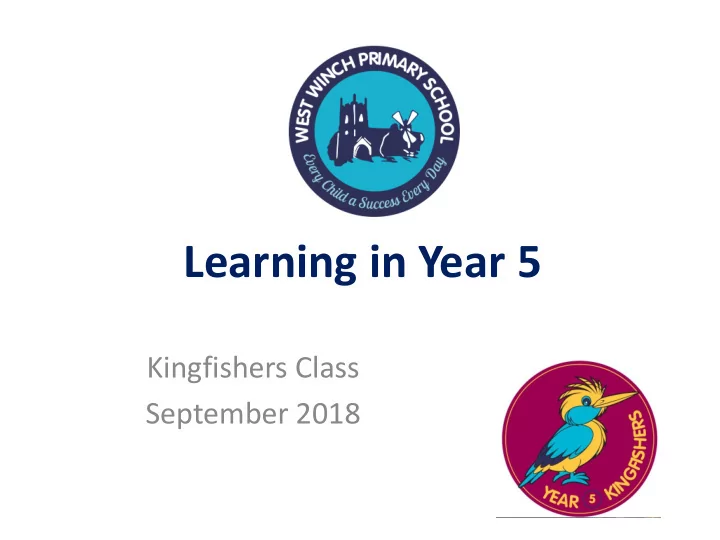

Learning in Year 5 Kingfishers Class September 2018
What we learn • All subjects in the National Curriculum • English – speaking and listening, reading and writing • Maths • Science • Art and design, computing, design technology, geography, history, music, PE • French or Spanish (in Key Stage 2)
Reading scheme Our books are organised into book bands. Children work through these book bands as they learn to read.
Reading By the end of Year 5 we hope that children will be reading books from the grey, dark blue or dark red book bands. If a child finishes dark red, they will become a class ‘ free reader ’ with books selected from our class library to enrich and deepen their understanding. Black is reserved for Year 6.
Band 12 – Brown
Band 13 – Grey
Band 14 – Dark blue
Band 15 – Dark red
Rising Stars reading tests
How you can help your child with reading • Talk about fiction and non-fiction texts • Read to your child at home • Read with your child at home • Ask questions – encourage them to predict what might happen next, how characters change in stories, to infer and ‘read between the lines.’
Useful questions • What happens in the story? • What is the book about? • Which other texts is it similar to? How? • Who is in the story? • What do you think this character is like? How do you know? • What do you think will happen next? • What is the title of the story? • Is this book fiction or non-fiction? How do you know? • What did you learn in the book? • What is your favourite part of the story? Why? • Who is your favourite character? Why? • What has the author done to move the story on or create tension, mood, atmosphere, etc.
Writing Key skills in Year 5 Children … • Talk about their writing • Join fully • Try to write extended sentences with 2 or more clauses • Write stories with at least 5 paragraphs • Explore different tenses and verb forms • Begin to use a full range of punctuation: Full stops . Commas , Semi-colons ; Colons for lists : Inverted Commas “ ” Question Marks ? Exclamation Marks ! Parentheses – pairs of commas, brackets ( ) and Dashes – to add extra information and emphasis • Spell Year 3/4 and Year 5/6 words • Use different types of conjunctions and clauses • Write a mixture of long and short sentences for variety • Follow the KS2 presentation code • Choose interesting and thoughtful vocabulary
Writing
How you can help your child with writing • Help them to learn spellings, spelling patterns and word meanings • Talk about different types of text • Encourage them to find out about new words • Encourage them to think deeper about what who they are writing for and the effect they are trying to achieve
Maths Key skills in Year 5 Children … • Read, write, order and compare numbers to at least 1,000,000 • Solve problems with such numbers • Add and subtract whole numbers with more than 4 digits using columnar methods • Multiply and numbers with up to 4 digits by a 1-digit number (long multiplication) • Divide numbers with up to 4 digits by a 1-digit number using short division (bus stop) • Multiply and divide whole numbers and those with decimals by 10, 100 and 1000. • Solve multi-step addition, subtraction, multiplication and division problems in context. • Recognise tenths, hundredths and thousandths. • Interpret & convert mixed numbers and improper fractions.
Maths Key skills in Year 5 Children … • Recognise the per cent symbol (%) and relate to fractions and decimals • Convert between kilometre and metre, metre and centimetre, centimetre and millimetre; kilogram and gram; litre and millilitre • Calculate and compare the area of squares and rectangles, using cm 2 and m 2 • Solve problems involving converting between units of time • Solve problems involving adding/subtracting measurements • Identify 3D shapes from 2D representations • Measure angles in degrees, identify ¼ turns and 90 o , ½ turns (180 o ), acute, right, obtuse and reflex angles • Distinguish and reason between regular and irregular polygons • Identify, describe and present shapes using reflection and translation • Complete, read and interpret information from tables, including timetables • These are just the ‘key’ targets!
How you can help your child with maths • Go through your child’s homework with them to check their understanding • Ask and help them where they need to improve • Help them with problem-solving and reasoning • Keep practising tables and mental maths facts • Help them to look for Maths in everyday situations
How you can help your child with maths • https://www.timestables.co.uk/ • https://www.topmarks.co.uk/maths-games/7- 11-years/times-tables • https://www.topmarks.co.uk/maths- games/hit-the-button
Assessment in Year 5 Formal assessments will be given every half term in the following: • GPV (grammar, punctuation and vocabulary) • Spelling (mainly from the Yr5/6 word list) • Reading (comprehension questions on two text types/genres) • Writing • Maths GPV, Spelling, Reading and Maths follow the Rising Stars format – sample questions for each half term ’ s test can be found on the school website. Additional assessments will be given for each Science unit, as well as Year 6 SAT practice and past papers later on in the year.
Recommend
More recommend